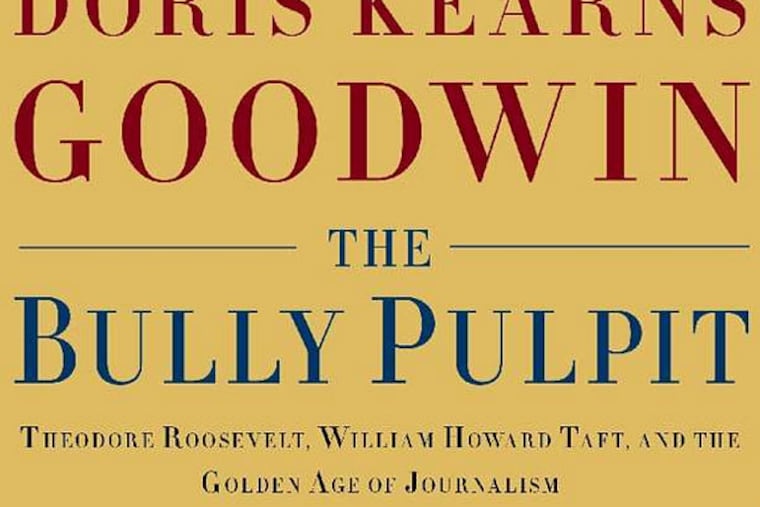Teddy and Taft - a friendship gone sour
In 1908, President Theodore Roosevelt made good on his promise not to seek reelection and hand-picked William Howard Taft, his secretary of war, as his successor.

The Bully Pulpit
Theodore Roosevelt, William Howard Taft, and the Golden Age of Journalism
By Doris Kearns Goodwin
Simon & Schuster. 960 pp. $40.
nolead ends nolead begins
Reviewed by Glenn C. Altschuler
In 1908, President Theodore Roosevelt made good on his promise not to seek reelection and hand-picked William Howard Taft, his secretary of war, as his successor.
The two men had met decades earlier, when Roosevelt was head of the Civil Service Commission and Taft served as solicitor general of the United States. Through the years, Taft observed, their relationship became "one of close and sweet intimacy." Convinced that Taft shared his progressive agenda - regulation of corporations and railroads, a more equitable distribution of wealth, protection of the rights of workers, and conservation of natural resources - Roosevelt cajoled and corralled Republicans to nominate him and worked tirelessly to help him defeat William Jennings Bryan in the general election.
Less than four years later, the friendship had ruptured. Certain that Taft had become the captive of conservatives in the Republican Party and corporate interests, Roosevelt withdrew his "no third term" pledge, threw his hat into the ring, lost the Republican nomination to Taft, and ran on the "Bull Moose" party ticket.
In 1912, although Woodrow Wilson received slightly more than 40 percent of the popular vote in a three-way race, he became the 28th president of the United States, and the progressive wing of the Republican Party was eviscerated.
In The Bully Pulpit, Doris Kearns Goodwin, the author of No Ordinary Time: Franklin and Eleanor Roosevelt and Team of Rivals: The Political Genius of Abraham Lincoln, uses "the complex contours of the consequential friendship" between the volatile Roosevelt and the jovial and judicious Taft to craft an engaging and informative chronicle of the politics of the Progressive Era that places special emphasis on the influence of muckraking journalists and the different ways her presidents handled them.
A gifted narrative historian and biographer, Goodwin vividly brings to life her large cast of characters. She captures the ambition, idealism, and sense of camaraderie of Ida Tarbell, Ray Stannard Baker, Lincoln Steffens, and William Allen White, the crusading reporters who produced dozens of essays for publisher S.S. McClure. A manic-depressive with a spark of genius, McClure believed that "the first step toward curing an evil is to make it known," and used his magazine to ignite a revolt against corruption and oppression in business, finance, and government.
Goodwin also provides a poignant portrait of Maj. Archie Butt, the White House aide who found himself caught in a tug-of-war between two presidents he respected and adored, cut short his vacation during the bitter nomination fight, and went down with the Titanic.
And she contrasts Edith Carowe Roosevelt, who stepped outside of her traditional role but once, early in their marriage, to press her husband not to run for mayor of New York City, and Nellie Herron Taft, who persuaded her spouse (on three occasions!) not to accept the appointment to the Supreme Court he coveted so that he could run for president, and, as first lady, spoke out against unsafe working conditions for government employees and helped design a public park in Washington.
The interpretive framework of The Bully Pulpit sticks closely to conventional wisdom. Goodwin credits progressives with replacing the laissez-faire philosophy that dominated American politics for a half-century with a conviction that government had a responsibility to protect and promote economic opportunity and social justice. Like the eminent historian Richard Hofstadter, she defines the progressive mind as a journalistic mind, committed to information and exhortation as prerequisites to action. And Goodwin attributes the clash between Roosevelt and Taft to ego, ambition, and vastly different personalities - not to mention fundamental differences over public policy.
The Bully Pulpit leaves some important questions unanswered. Goodwin demonstrates that Roosevelt used journalists, giving them advance notice of decisions and appointments, to court public opinion. He gave Lincoln Steffens a card, for example, ordering officials to tell him "anything whatever about the running of the government that you know (not incompatible with the public interest)."
Such actions make it all the more puzzling that Roosevelt, even if he was exasperated by a scurrilous attack on the Senate in a Hearst publication, would denounce investigative journalists as akin to "the Man with the Muck-rake" in John Bunyan's Pilgrim's Progress, "who could look no way but downward."
Nor does Goodwin adequately explain why, about 1906, a "literature of distraction" began to replace "the literature of inquiry" epitomized by McClure's Magazine. Could Roosevelt's speech, one wonders, really have "crystallized a nascent sentiment of disfavor toward the new journalists"?
With Ray Stannard Baker, it's clear, Goodwin regrets that the attempts of responsible reporters to do what was "good and sound and progressive" became "lost and forgotten." And she hopes that a time of awakening lies ahead, when a new generation is drawn to work "that seemed once almost a mission and a call."